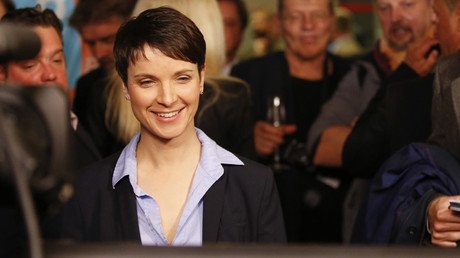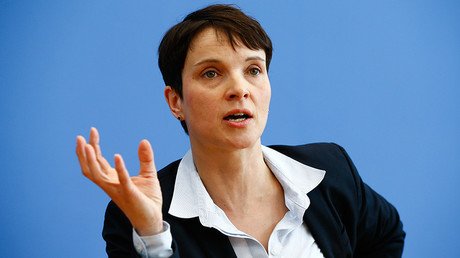‘No change of course’: Merkel stays firm on refugee policy despite anti-migrant AfD election success
German Chancellor Angela Merkel has vowed to keep her course on the refugee crisis despite suffering defeats in two out of three states in major regional elections, in which a surprisingly large number of voters turned to the anti-migrant AfD party.
Merkel's Christian Democratic Union (CDU) lost in two states it had placed its hopes on, including Baden-Wuerttemberg, a traditional conservative stronghold of the party. The German media were quick to dub the outcome of the elections a “day of horror for Merkel” and “Black Sunday for the CDU.” The elections were largely regarded as a referendum on Merkel's open-door policy.
Yet, following a night of mixed fortunes, Chancellor Merkel stood firm on her liberal refugee policy, meeting with the three main candidates for her party in Berlin on Monday and making clear that despite election results marking a “difficult day for the CDU,” she won't change her course, convinced there has to be a European solution to the migration crisis.
“I am firmly convinced, and that wasn't questioned today, that we need a European solution and that this solution needs time,” the chancellor stated.
Merkel’s spokesman, Steffen Seibert, confirmed the decision, saying that “the federal government will stay on its refugee policy course, fully determined, at home and abroad.”
Seibert added that Merkel plans to continue with her strategy of beefing-up security of Europe’s external borders, as well as working on the deal with Turkey to reduce the inflow of asylum seekers.
"The goal must be a common, sustainable European solution that leads to a tangible reduction of the number of refugees in all [EU] member states," Seibert said, as stated by the AFP.
Merkel’s fellow party members say it’s hardly wise for her to change her stance now, especially as the vote also showed there is no obvious successor to the chancellor. “It would be wrong to bring about a change of course [on migrants] now,” Germany's European commissioner Guenther Oettinger, a member of Christian Democrats, told the Funke newspaper.
Right-wing AfD makes gains
The dismal result for Merkel’s party amounted to a resounding success for the right-wing Alternative for Germany (AfD), a party only founded three years ago, but which has been gaining in popularity since the migrant crisis enveloped the EU in 2015.
With Sunday’s votes counted, the AfD now has seats in half of Germany's 16 state legislatures and has its sights set on entering the national parliament in elections expected late next year.
Following her party's success, AfD chief Frauke Petry told RT that the results were “even better” than anticipated, and that the country “needs” her party.
“We have fundamental problems in Germany that led to this election result. In the months to come we’ll show that the AfD needs to be here, that Germany needs a new alternative – and that’s us,” she said.
After a record 1.1 million asylum seekers arrived in the country in 2015 alone, many Germans are worried about what will happen to their homeland with these numbers of newcomers. The mass assaults in the German city of Cologne on New Year’s Eve resulted in widespread outrage over the current refugee stance, with 81 percent of Germans claiming that the migrant crisis is “out of control” under Merkel’s rule.
AfD member Hugh Bronson says his party’s success underlines an increasing unhappiness with the current situation in the country: “We [the AfD] have the right answers for the questions the people ask. Merkel’s so-called refugee policy, which in my view is a migration policy, has not been liked by a lot of people. She doesn’t inform the people – she’s just ruling over their heads […] these three local elections were also a referendum about Merkel’s policy – and it’s a clear and decisive ‘no’.”
Another representative of the alternatives, Boris Preckwitz, claims Merkel’s current stance lacks support not just in her country, but in Europe as a whole: “We do not believe in what Merkel is trying to sell as the ‘European solution’. This is something where she is very isolated right now, if you look at the reactions of the other European countries, you see that basically she doesn’t have any other allies or any other countries that go along with her.”














